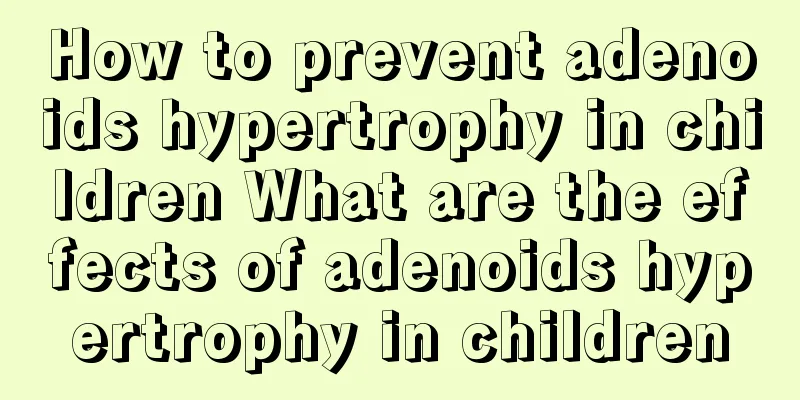How to prevent adenoids hypertrophy in children What are the effects of adenoids hypertrophy in children

|
Adenoid hypertrophy in children is a physiological inflammation, which can affect the child's ears, nose and throat in severe cases. Once parents find that their children have symptoms such as mouth breathing, snoring, and nasal congestion, they should take their children to the hospital for examination immediately. How to prevent adenoids hypertrophy in children1. Pay attention to oral hygiene. Children should develop good hygiene habits, especially oral hygiene, and develop the habit of brushing teeth in the morning and evening and rinsing mouth after meals to avoid the growth of a large number of bacteria in the mouth, which may cause the problem of enlarged tonsils. 2. Pay attention to cold protection and warmth. Children have weak resistance. Once they are attacked by cold air, they may catch a cold and induce adenoid hypertrophy. Everyone must take measures to protect children from cold and warmth. Avoid large temperature differences between indoor and outdoor. Also, add or remove clothes at any time according to weather changes to reduce the occurrence of respiratory diseases. 3. Adjust healthy diet. Try not to let your child eat spicy and greasy food. Also, avoid cold and raw food. Eat more fresh fruits and vegetables, which can not only provide a variety of nutrients to the body, but also enhance the body's resistance. 4. Adjust the living environment. If you live in a hot and humid environment for a long time, it is easy to breed a lot of mold. When children come into contact with these molds, it is possible to induce adenoid hypertrophy. You must pay attention to adjusting the healthy living environment at ordinary times, keep the indoor air fresh, and avoid the environment being too humid. What are the effects of adenoid hypertrophy in children?1. Impact on facial development. If a child suffers from adenoids hypertrophy, it will easily affect facial development. After the disease, the child's nasopharynx will become narrow, which will easily lead to nasal congestion and affect breathing. The child will habitually breathe through the mouth. Long-term this breathing state will affect facial development and cause facial deformation. 2 Bronchitis Adenoids hypertrophy can cause nasal congestion, so that the mucus will flow back to the throat, thereby irritating the mucous membrane of the lower respiratory tract and causing coughing symptoms, which will induce bronchitis over time. 3. Affects growth and development because children's development requires a lot of oxygen, but when the adenoids are enlarged, the child's nasopharynx will become narrow, which will cause the child to snore during sleep. Long-term snoring will cause the child to suffer from hypoxia, which will directly affect the development of the brain and cause insufficient oxygen supply to the brain, thereby reducing the secretion of growth hormone and affecting the child's development and growth. 4 If patients with slow reaction breathe through their mouths for a long time, it is easy to cause ischemia and hypoxia in the head, which will lead to symptoms such as slow reaction, memory loss, headache, dizziness, etc. 5 Ear symptoms: Adenoids hypertrophy may also cause otitis media, which is caused by severe illness affecting the pharyngeal opening of the Eustachian tube. When otitis media occurs, the patient will experience hearing loss, tinnitus, etc. Can children's adenoids hypertrophy heal on its own?The adenoids of preschool children are very active. They will slowly shrink from the age of 10, so some children can recover on their own, but it will take a long time. Parents should check and treat their children in time if they find abnormalities in their children, otherwise it will cause serious consequences. Because adenoids hypertrophy is very harmful if not treated in time, children will have difficulty breathing when they sleep because their respiratory tract is blocked, so parents should pay attention to it. How to treat adenoid hypertrophy1. Simple treatment: If adenoids hypertrophy is not very serious, you can take this method. Eat a balanced diet to reduce the chance of catching a cold and enhance your resistance. When you reach puberty, the adenoids will shrink on their own and the symptoms may be alleviated. 2. Drug treatment: If you have rhinitis and sinusitis, the symptoms can be relieved through proper nasal ventilation treatment. 3. Surgery If the adenoids are severely enlarged and conservative treatment is difficult to solve, the adenoids can be removed surgically. If the tonsils are also large, they can be removed together. If the tonsils are small, the adenoids can be removed alone. This is a radical cure. |
Recommend
Can babies eat green dates? Can babies eat more green dates?
When babies start to grow teeth, they like to be ...
Why are children too thin? How can children gain weight?
Usually, children's stomachs are very small, ...
Can pregnant women eat hawthorn? What are the harms of eating hawthorn for pregnant women?
Hawthorn is a very common food. It tastes sweet a...
Pregnancy Tips What are the symptoms of implantation bleeding
There are many signs of pregnancy, and implantati...
What should I check before getting pregnant? What should I do to prepare for pregnancy?
Mothers who are ready to have a baby must go to t...
What are the harms to children's health if they don't eat breakfast?
The starting point of the day is breakfast! But n...
Why do you need to shave before giving birth? Does it hurt to shave before giving birth?
Childbirth is the most difficult time in a woman&...
What are the dangers and embarrassments during childbirth?
The ancients said, "Giving birth is like wal...
Does the baby need physical cooling if he has a fever and falls asleep? How to cool him down?
When the baby has a fever and is asleep, should t...
What should I do if my 7-year-old child doesn't listen to his parents? How can I make my child listen to his parents?
Many times you will find that your child is not l...
How to distinguish between domestic and imported Kao diapers? Are Kao diapers good to use?
Kao's diapers are divided into domestic and i...
Can breastfeeding and bottle feeding be done at the same time? The difference between breastfeeding and bottle feeding
Nowadays, few mothers feed their children with fo...
Is Wyeth Baby Joy milk powder good? How much is Wyeth Baby Joy milk powder?
After the baby is born, parents will start to buy...
What should I do if my child's earwax becomes hard? Is it harmful if my child's earwax becomes hard?
What should we do when children's earwax beco...
Which parts of the baby are prone to dislocation? Five major parts are prone to dislocation
The baby's body is very soft, and many parent...









